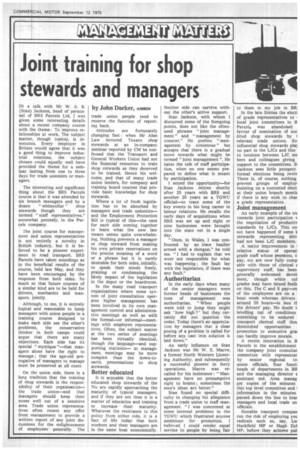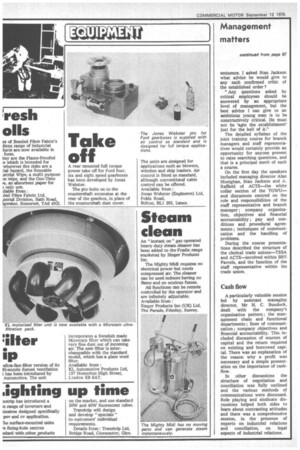Joint training for shop stewards and managers
Page 69

Page 70

If you've noticed an error in this article please click here to report it so we can fix it.
by John Darker, AMBIM
IN a talk with Mr W. S. B. (Stan) Jackson, head of personnel of BRS Parcels Ltd, I was given some interesting details about a recent company course with the theme: To improve relationships at work. The subject matter, though topical, is innocuous. Every employer in Britain would agree that it was a good thing to improve industrial relations; the subject chosen could equally well have provided the theme for a seminar lasting from one to three days for trade unionists or managers.
The interesting and significant thing about the BRS Parcels course is that it was attended by six branch managers and by a dozen " whitecollar " shop stewards though they are termed "staff representatives," somewhat genteely, in the Parcels company.
The joint course for management and union representatives is not entirely a novelty in British industry, but it is believed to be a pioneer experiment in road transport. BRS Parcels have taken soundings as to the beneficial results of the course, held last May, and they have been encouraged by the response from both sides. So much so that future courses of a similar kind are to be held for drivers, mechanics and managers, jointly.
Although, to me, it is entirely logical and reasonable to lump managers with union people in a training course designed to make each side see the other's problems, the conservative thinker in both camps could argue that there are many objections. Each side has its special "mystique "—that managers alone have the right to manage ; that the age-old prerogative of managers to manage must be preserved at all costs.
On the union side, there is a long tradition that the training of shop stewards is the responsibility of their organisation— the trade union—and that managers should keep their noses well out of a sensitive area. Trade union representatives often resent any offer from management to provide a written report of any joint discussions for the enlightenment of employees generally. The trade union people tend to reserve the function of reporting back.
Attitudes are fortunately changing fast : when Mr Alan Law lectured Texaco shop stewards at an in-company seminar reported by CM he confessed that the Transport and General Workers Union had not the financial resources to train shop stewards as they deserved to he trained. Hence his welcome, and that of many trade union leaders, for company and training board courses that provide basic knowledge for shop stewards.
Where a lot of fresh legislation has to be absorbed by managers and trade unionists— and the Employment Protection Bill is typical of this—the case for each side coming together to learn what the new law means seems quite overwhelming. Nothing prevents a manager or shop steward from making his own private reservations on the precise meaning of a word or a phrase but it is surely desirable for both sides, initially, to speak their minds freely, praising or condemning the likely impact of the legislation in the depot or the boardroom.
In the many road transport organisations where some system of joint consultation operates higher management has been involved in its own management control and administrative meetings as well as with the formal—or informal—meetings with employee representatives. Often, the subject matter at the two series of meetings has been virtually identical, though the language—and supporting statistics— at management meetings may be more complex than the down-toearth presentations to shop stewards.
Better educated
It is arguable that the better educated shop stewards of the 70s are rapidly approaching the maturity of typical managers, and if they are not then it is a matter of education and training to increase their maturity. Whatever the resistance to this policy from either side, it is a fact of life today that both workers and their managers are in the same boat economically. Neither side can survive without the other's active support.
Stan Jackson, with whom I discussed some of the foregoing points, does not like the oftenused phrases "joint management" and "management by consent." He prefers " management by consensus" but accepts that there is a gradual move towards what might be termed "joint management ". He hates the talk of staff participation, when no one seems prepared to define what is meant by participation.
I seized the opportunity—for Stan Jackson retires shortly after 25 years with BRS and another 20 years as a TGWU official—to trace some of the key events in his long career in labour relations. He recalls the early days of acquisitions when ERS was set up and eight or nine businesses were brought into the state net in a single day.
"Once, in Wales, I was confronted by an irate haulier armed with a shotgun," he told me. "I had to explain that we were not responsible for what was happening ; the fault lay with the legislators, if there was any fault."
Authoritarian
In the early days when many of the senior managers were former heads of businesses the tone of management was authoritarian. "When people were told to jump they might ask 'how high ?' but they certainly did not question the order. Today there's an appreciation by managers that a clear posing of a problem is called for before any cast iron solution is laid down."
An early influence on Stan Jackson was Mr W. E. Macve, a former North Western Licensing Authority, and subsequently a successful pioneer in ferry operations. Macve was recalled for his insistence : " Management have no presumptive right to brains ; sometimes the men's ideas are better."
Stan found no special difficulty in changing his allegiance from a trade union to staff management. "I was concerned at some internal problems in the TGWU which frustrated anyone ambitious for promotion. I belier ed I could render equal service to people by being fair to them in my job in BR:
In the late Sixties the elect] of grade representatives to local joint Committees in B Parcels was abandoned favour of nomination of acc dited shop stewards by i relevant trade unions, So influential shop stewards pla, no part in the LJCs and this to tensions between LJC ME hers and colleagues giving support to the committees. Si Jackson sees little prospect formal elections being reviv There is, of course, nothing prevent groups of employ! insisting on a contested elect: at their union branch meetit if there is any wish to char a grade representative.
Joint management
An early example of the tre towards joint participation r: the negotiation of productiv standards by LJCs. This col not have happened if some 11 stewards representing driv had not been LJC members.
A major improvement in relative status of operati grade staff whose pensions, s pay, etc are now fully comp able with those of clerical supervisory staff, has been generally welcomed devell merit, though white col grades may have mixed feelir on this. The C and S pay—rn of the employees are on a hour week whereas drivers around 30 hours—is less tlthe drivers' pay. No doubt t levelling out of conditions something to be endured transport clerical staff thot diminished opportunities promotion to executive gra( can hardly improve morale.
A recent innovation in B Parcels is the establishment the company joint consultat committee with representat by senior regional tri union officials, four funct: heads of departments in BR and the managing director e assistant md. Area manag get copies of the minutes this top level committee and 1 information in the minutes passed down the line to brar managers and local trade un officials.
Sizeable transport compan run the risk of employing yot; radicals such as, say, Let Huckfield MP or Hugh Dyl MP, before they achieve put eminence. I asked Stan Jackson what advice he would give to any such confirmed critic of the established order ?
"Any questions asked by critical employees should be answered by an appropriate level of management, but the best advice I can give to an ambitious young man is to be constructively critical. He must not be 'agin the establishment' just for the hell of it."
The detailed syllabus of the joint training course for branch managers and staff representatives would certainly provide an opportunity for anyone present to raise searching questions, and that is a principal merit of such a course.
On the first day the speakers included managing director Alan Monighan, Stan Jackson and A. Raffield of ACTS—the white collar section of the TGWU— and discussons centred on the role and responsibilities of the staff representative and branch manager ; company organization, objectives and financial accountability ; pay and conditions and procedural agreements; techniques of communication and the handling of problems.
During the course presentations described the structure of the clerical trade unions—TSSA and ACTS—involved within BRS Parcels, and the function of the staff representative within his trade union.
Cash flow
A particularly valuable session led by assistant managing director, Mr H. C. Bundock, dealt with the company's organisation pattern ; the management chain and functional departments ; lines of communication; company objectives and financial accountability. This included discussion of sources of capital and the return required on existing and borrowed capital. There was an explanation of the reason why a profit was necessary and a simple presentation on the importance of cashfiow.
In other discussions the structure of negotiation and conciliation was fully outlined and the various methods of communications were discussed. Role playing and sindicate discussions helped both sides to learn about contrasting attitudes and there was a comprehensive session, in the presence of experts on industrial relations and conciliation, on legal aspects of industrial relations,
















































































































